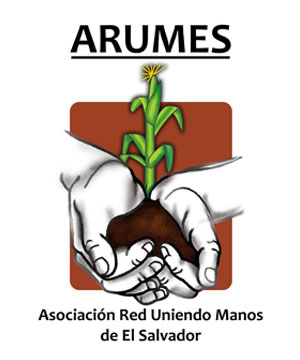“How could we have ever believed that it was a good idea to grow our food with poisons?” – Jane Goodall

About the Network
Asociación Red Uniendo Manos El Salvador (ARUMES), is a fraternal network composed of grassroots farming organizations, non-governmental organizations and church bodies which aims to develop and implement campaigns of awareness and capacity building, social and political advocacy, to propose and promote structural changes and human development, which will enable people to live fulfilling lives, with dignity, on a healthy planet. We work closely with the communities and people most affected, especially women, youth and indigenous people, under a holistic approach that encompasses educational, emotional, economic, social and spiritual well-being.
We focus much of our work on advocacy trainings to strengthen the capacity of leaders from the most vulnerable populations, so they are better equipped to advocate for and defend their rights to live full, happy lives in a healthy environment.
We promote the recovery of ancestral foods and agriculture based in agroecology, free from pesticides. We demonstrate the viability of agroecology on demonstration plots with native and creole seeds, diversified crops, and fertile living soils. We involve the whole family in caring for the garden plot, and they enjoy the health and well-being that comes with eating fresh, healthy foods. We also demonstrate that these ancestral crops and agroecological techniques are adaptive and resilient in times of drought and floods that are more common with climate change.
Our Vison
It’s our vision to be a movement of diverse social and religious groups that build community, committed to human development, equity, equality and the defense of nature while promoting inclusion and a culture of peace.

Selected seeds from a farm in San Luis Tappa, El Salvador, kept for the next planting season. Photo by Valery Nodem.
Our Mission
It’s our mission to raise awareness and build the capacities of all partner communities so they know their rights, are able to defend their rights when threatened or violated, and are able to advocate for public policies and legislation that will transform the structures that would enable people to live fulfilling lives on a healthy planet.
Our core values are love of neighbor, spirituality, respect, solidarity, service and justice.
Our Strategic Objectives
- To advocate for legislation that prohibits agrotoxins;
- To advocate for the Food Sovereignty Law and the Water Law;
- To facilitate processes of awareness-raising and sensitivity training, education, and organization in order to strengthen and build capacity among women, men and youth;
- To strengthen local, regional, national, and international alliances to advocate together in defense of clean, safe and sovereign agriculture, free from pesticides.
- To promote relationships based on equity, equality, respect and solidarity as well as lifestyle integrity practices within and between the natiosnal and international communities.
Our Current Campaign

Alex Cuellar, a local famer from the village of Guachipilin, San Pedro Puxtla in Ahuachapán, used to, in his own words, “poison the land with the worst of the worst toxic chemicals.” Over ten years, he converted his land into a diverse, thriving, fully organic farm. Photo by Kristi Van Nostran.
We are working towards an agriculture free from agrotoxins. We are advocating for legislation that prohibits the use of harmful pesticides in agriculture, and we are advocating for a reduction in the aerial fumigation of sugar cane plantations which leads to soil and water contamination and chronic kidney disease in humans.
The monoculture of sugar cane has expanded dramatically throughout the coastal belt of El Salvador, from the municipality of Ahuachapán to the municipality of La Unión. A total of 296.2 kilometers are planted with this single crop, displacing subsistence farming families from the land, leaving them without the ability to farm basic grains (beans, corn) and other crops to feed themselves and their communities.
Chronic kidney disease is seen frequently among families that live in proximity to the sugar cane plantations, as they are exposed to contaminants from the many chemicals used in production. There are cases of newborns who have been diagnosed with chronic renal insufficiency and are receiving dialysis treatment.
Photo for the banner on this page thanks to Kristi Van Nostran.
